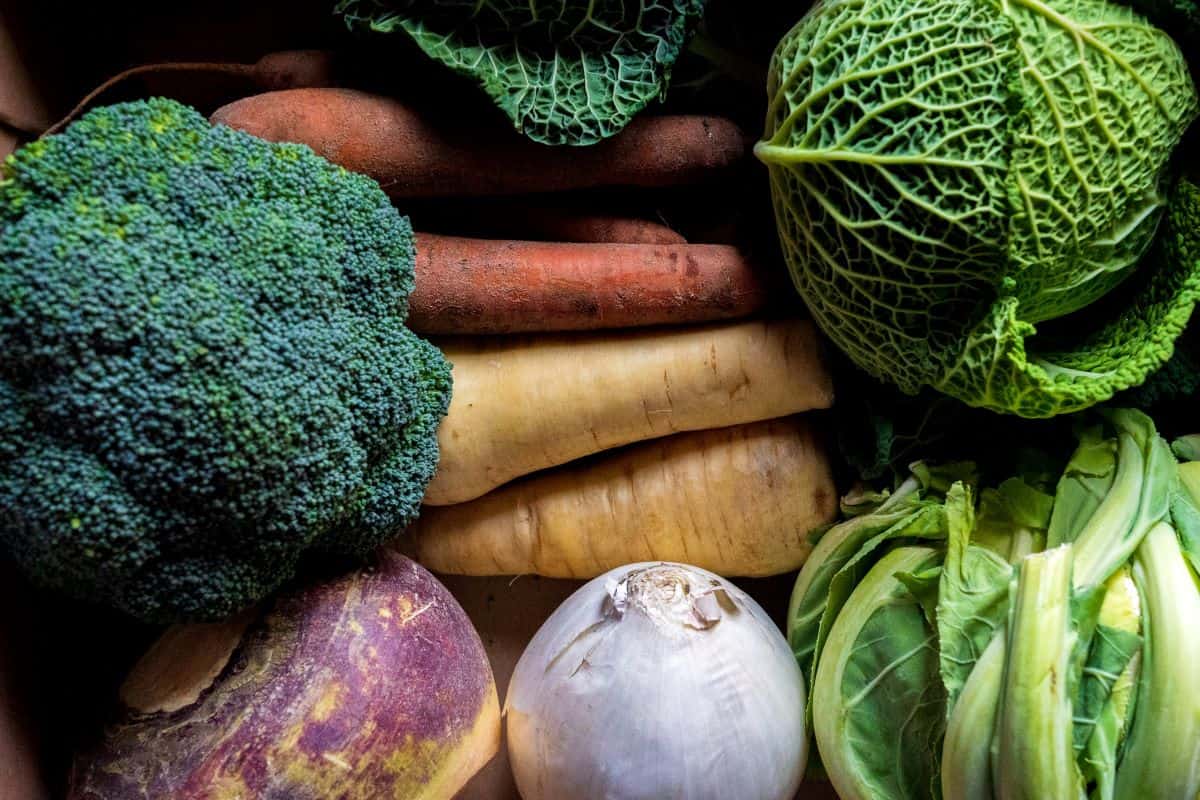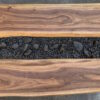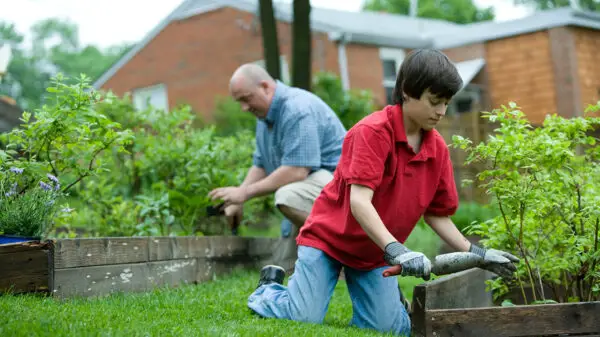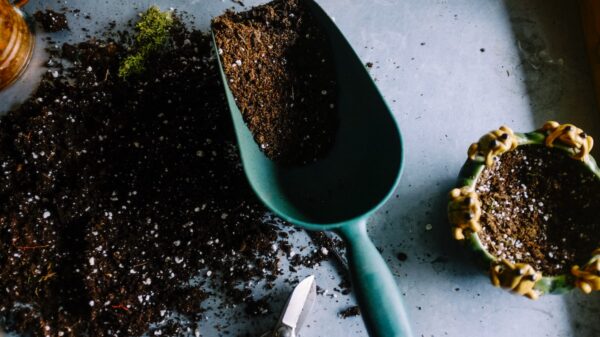Winter Garden Vegetables That Thrive In the Cold
We all know that garden vegetables grow during the summer months. But garden vegetables can also grow during winter! When we think of garden vegetables we usually think of tomatoes, onions, and green beans. I was eager to carry my gardening skills into the winter months but unsure if this was even a possibility. After some research, I found some vegetable options that will grow during the cold months!
What are the 9 garden vegetables that grow during the winter months? The best vegetables to grow are kale, radishes, onions, basil, potatoes, swiss chard, lettuce, spinach, and winter squash! These garden vegetables grow during the winter months because they are planted in the early fall months.
The garden vegetables all grow during the winter months but each plant has a different growing schedule. To successfully grow these vegetables, you must know the garden vegetables growing schedules and how to plant them.
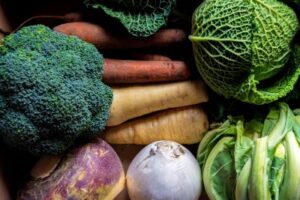
9 Winter Garden Vegetables to Grow
There’s no need to go without delicious and healthy vegetables during the winter months. With garden vegetables that grow during the winter, you’ll have complete control over what your family eats – no more worrying about pesticide-laden produce from a supermarket.
1. Kale
Kale is a hearty green that grows during the fall and winter months. The leaves of kale are thick enough to resist frost and freezing temperatures. Kale is a garden vegetable that will grow during the winter and has even been known to survive an entire winter without being harvested!
2. Radishes
Radishes are quick growers and gardeners often find themselves harvesting radish greens before growing them for their root vegetable. These garden vegetables can be grown throughout the fall and winter months as long as the garden is well prepared for freezing temperatures.
3). Onions
Onions can be planted in the garden during late fall and harvested all winter long! The tops will die as it gets cold, but don’t worry – you can continue to harvest from down below. This garden vegetable is a prime example of how to garden vegetables grow during the winter months!
4. Basil
Basil is very easy to grow and thrives in warm temperatures; therefore, gardeners often plant basil during the summertime and then go back and harvest fresh basil throughout the fall and winter months. You can even place your basil plant inside where it will constantly provide you with fresh leaves to use!
5. Potatoes
Potatoes are garden vegetables that grow underground. They usually grow during the summer months, but gardeners have been known to harvest potatoes during winter as well!
Growing potatoes is a great way to save some garden space as they don’t require much room – they can even be grown right inside your garden!
6. Swiss Chard
Swiss chard is a garden vegetable that grows in similar conditions as lettuce. Chard likes cooler temperatures and tends to grow best during the fall and winter months.
7. Lettuce
Lettuce is one of those garden vegetables you can find growing wild in temperate regions – it’s native to Europe and western Asia!
Gardeners love lettuces because it has multiple uses; not only can you eat the garden vegetable itself, but you can also use the leaves of lettuce as garden mulch!
8. Spinach
Spinach is one of those garden vegetables that gardeners love because it’s easy to grow and it will quickly become your favorite garden plant. It thrives during the fall and winter months (it even has a longer growing season than some garden vegetables).
Plus spinach has many health benefits for humans. Not only can you eat this garden vegetable raw or cooked, but you can also feed it to your pets; I’ve heard that feeding some raw spinach to your cat or dog makes their fur nicer!
9. Winter Squash
Winter squashes are members of the cucurbit family which includes watermelon, cucumbers, and pumpkin. Winter squashes are garden vegetables that gardeners love because they grow very well in cold climates!
They are garden vegetables that grow during the winter months when other garden vegetable options have died off. With this wide variety, you are sure to have garden vegetables to eat year-round!
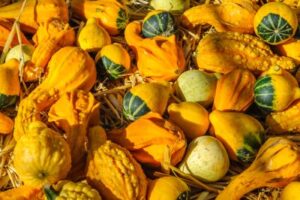
Can You Grow Tomatoes During Winter?
With some planning and preparation, you can grow tomatoes during winter and enjoy delicious, juicy tomatoes during (and maybe even long after) the cold months of the year.
So how can you grow tomatoes during winter? Tomatoes are, of course, a fruit that needs warmth to grow during the summer months. With some planning and preparation, you can grow tomatoes during winter.
Often it is more successful to plant them during fall so they have time to grow roots before it gets too cold outside during late fall and winter. In mild areas, you can even grow tomatoes during winter with a little extra help from a greenhouse or a cold frame.
What Are the Best Type of Tomatoes to Grow?
The variety of tomatoes you want to try and grow during winter is going to be important. Heirloom varieties tend to have the ability to be more cold-resistant than other types of tomatoes, so consider trying some heirloom varieties during winter.
In terms of the setup, you don’t have to start from scratch during winter. You can use a greenhouse or a cold frame during the fall and winter months to help protect your tomatoes from the elements during this time of year. In addition to being able to grow vegetables during winter, greenhouses can help provide insulation during winter.
There are several things to think about during winter when you want to grow tomatoes during the cold months of the year. While it may not be as easy during winter, with some planning and preparation, you can still grow delicious, juicy tomatoes during (and maybe even long after) the cold months of the year.
What Are the Different Growing Schedules?
Some garden vegetables, like spinach and swiss chard, grow during the winter months and can be harvested in the early spring months. Other garden vegetables, like tomatoes and cucumbers, grow during the summer months and can be harvested in the fall.
During the winter garden season, gardeners must maintain their garden plants by harvesting them before they go bad. Winter garden vegetables such as carrots, parsnips, and turnips can be harvested until March. It is best to harvest garden vegetables in the early morning before it gets too hot.
The individual growing schedule of each vegetable is important because gardeners can plant garden vegetables like lettuce or spinach during the fall and get a garden vegetable they would normally only get in the summer!
How to Maintain Winter Garden Vegetables?
Winter garden vegetables, unlike summer garden vegetables, do not need to be fertilized or weeded as often. You should also know how and when to harvest garden vegetables during the winter season.
To maintain garden vegetables during winter, gardeners should cut off garden shoots when they are no more than six inches high with a sharp garden knife or shears just above the garden soil.
Winter garden vegetables should be harvested about every two weeks to maintain them during the winter garden season. Gardeners should also apply a thick layer of mulch around garden plants after they are harvested to prevent weeds.
How to Plant Garden Vegetables During Fall
Some gardeners choose to grow garden vegetables during the autumn months because garden vegetables that grow during the winter months (like kale, peas, carrots, etc.) are not yet fully mature and gardeners often don’t want to wait.
If you choose to garden during the autumn months, you must try to garden vegetables that grow during the spring season since many gardeners already have garden vegetables growing during the summer!
How Will I Know if My Garden Vegetable is Ready for Harvest?
Some garden vegetables can be harvested as soon as they appear in your garden! For example, peas are ready as soon as they start bulging from their pods. Other garden vegetables take a little longer – some garden seedlings may need up to 3 months before you harvest them!
Yes, cucumbers will take 3 months from the time you plant them until they’re ready to eat. However, most garden vegetables on this list will take between 1-2 months before gardeners can harvest them.
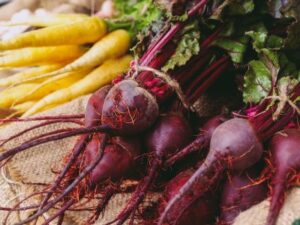
How Can I Get the Most Out of My Garden?
When you garden during the autumn months, garden vegetables must be harvested early enough so garden plants get time to grow again!
Some garden vegetables will need 6 weeks for garden plants to grow back but some garden plants only need 2 weeks out of the ground! If your garden is very fertile or if you use compost on your garden beds then this growing schedule will be more flexible.
Get Your Winter Garden Ready!
Knowledge is power, but the correct application is key! By knowing what garden vegetables you can plant through the seasons; you will be able to garden with ease and without worry during the growing season.
Don’t forget to maintain your garden during the winter months, as the result is delicious seasonal vegetables that can be easily made into soups, salads, and cooked with meat during the winter months!


